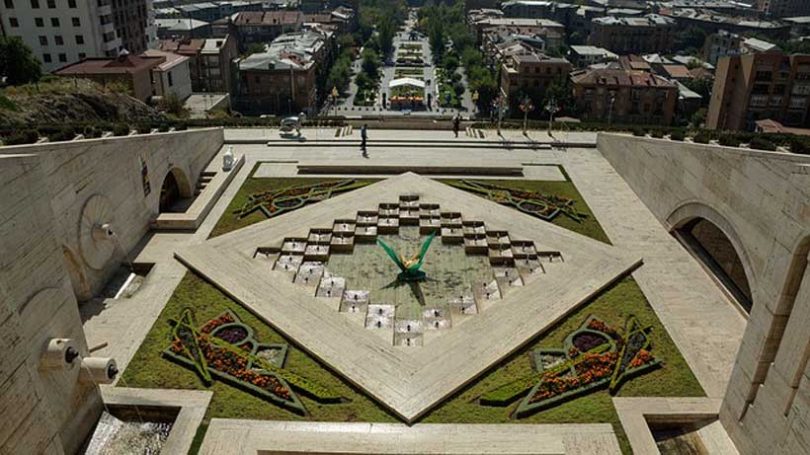By mid-July, within days of the latest flareup in fighting between Armenia and Azerbaijan, a flurry of articles written by Azerbaijani think tank members appeared on Modern Diplomacy (MD). Azerbaijani think tanks may have erroneously assumed that MD was a media battlefield between Armenians and Azerbaijanis after a Geopolitical Handbook on Armenian issues was published a month earlier.
On August 2, 2020, MD published an article entitled The Treasure Map to the Forgotten Epoch of the Iravan Khanate, by Irina Tsukerman. The article uncritically adopts the most vulgar of Azerbaijani historical falsifications claiming that most of Armenia and its capital, Yerevan, have little or no Armenian lineage – and are instead Azerbaijani. The rambling nature of this four-thousand word article, and its spectacular disregard for the accepted historical record, seemed designed for the express purpose of appealing to Azerbaijanis and offending Armenians, for example by pointedly referring to the 2800-year-old Armenian capital city as Iravan, instead of Yerevan.
The thesis of Tsukerman’s article on MD dates back well over a generation. It parrots nationalist screeds, penned by Azerbaijani and sometimes Turkish propagandists, usually intended for local consumption. In recent years, many such works have been translated into reasonable English and evidently distributed for posting by western authors under their names. A common characteristic of these articles is their lack of hard references – a relic from the Soviet days. Tsukerman’s MD article appears to have been post-annotated with reference links before it was submitted to MD. Most of these links are of low quality and/or have little to do with the associated text. Forty-five of the fifty-three reference links were Wikipedia articles, gratuitously including general Wikipedia articles on Russia, Armenia, Georgia, Azerbaijan, The Republic of Azerbaijan, Tehran, etc. Another reference points to a Turkish-language text that originally appeared in an anti-Armenian publication, Yeni Turkiye 62, which includes articles claiming Armenians committed genocide on Turks and Azerbaijanis – a claim widely known to be untrue, and similar in form, tactics and intent to Holocaust denial.
Within weeks of the apparent success of post-annotating an article in MD with useless reference links, Israel’s Begin-Sadat Center for Strategic Studies (BESA) published another anti-Armenian article of dubious integrity by Tsukerman, entitled “Russia and Iran’s Dangerous Energy Gambit in the Caucasus“. Due to a reader complaint noting the lack of any references and the article’s clear anti-Armenian bias, BESA initially took down the article, but then restored it the very next day, replete with ill-considered, low-quality references, not unlike those in Tsukerman’s MD article.
In my perhaps old-fashioned view, the provision of valid high-quality citations is a responsibility that every author should take seriously, and the verification of the quality of those citations is a responsibility that every editor should take seriously. Padding an article with useless and unhelpful citations pro forma, simply to be able to say that the article has citations, is the tactic of a college freshman – not one that I would expect to see in a scholarly publication. Evidently BESA operates according to a different set of standards.
This brings us to the larger question: Why do so many poorly referenced, factually inaccurate, anti-Armenian propaganda pieces appear in the world press? A short-term answer is that both the ruling family dictatorship in Azerbaijan, and the country’s supporting interests in the west need to bolster Azerbaijan’s image at home and abroad, especially after its significant military loss in the latest border flareup.
In the medium-term, one might note that the amount of western investment in Azerbaijani hydrocarbon extraction and transport is probably well over $100B, with British Petroleum accounting for $75B of that figure. Azerbaijan is also one of the few countries bordering Iran that is compliant enough to be used as a base for intelligence gathering and covert operations targeting Iran. Moreover, forty percent of Israel’s crude oil is supplied by Azerbaijan, and in return Israel has sold Azerbaijan at least $5B in high tech weaponry over the past decade. By contrast, Armenia has no viable petroleum reserves, and comparatively little with which to counter materially. Hence a much lower standard is set for the publication of Azerbaijani propaganda in the western press, and Azerbaijan is propped-up as a reliable partner to the Israeli public – this in spite of the fact that Azerbaijan is a Shia Muslim-majority country that refuses to open an embassy in Israel.
A rare glimpse at the longer-term answer can found in a September 2015 event where Israeli Knesset Members Oren Hazan and advisor Mendi Safadi visited Baku, Azerbaijan, for high-level meetings. During this visit, Safadi commented, “I’ve always been on the side of Azerbaijan, and we are ready to provide assistance and patronage to the Azerbaijani side to neutralize the influence of the Armenian lobby in the US Congress, the EU institutions, and international organizations.”
To this observer in Yerevan, it is manifest that Azerbaijan has enlisted help from certain actors in Israel and the Jewish diaspora in generating and promulgating pro-Azerbaijani propaganda, including anti-Armenian propaganda that falsifies the historical record and that is sometimes overtly racist in nature. Of course, with such an arrangement between two countries comes the opportunity for authors of a mercenary bent who are willing to lend their names to such falsifications. Since 2015, a large number of articles of this sort have appeared, for the most part in the Jewish press. Some writers have focused on the semi-frozen conflict over Nagorno-Karabakh. Others have attempted to characterize Armenia’s normal relations with Iran as in opposition to western-imposed sanctions, while neglecting to note that well over twice as much trade goes on between Azerbaijan and Iran. Still others characterize certain Armenian historical figures as fascist supporters of the Nazis during WWII, conveniently neglecting the fact that well over a quarter million Armenian soldiers never returned from fighting the Nazis, and that fact that Armenia was awarded twenty-four Israeli “Righteous Among Nation Awards, while Azerbaijan was awarded none.
Truth and open debate have little to do with this kind of industrial production of anti-Armenian propaganda. Opportunist writers posting such articles know very well the nature of the endeavor in which they are participating, yet they seem to feel that they can persist without regard to any cost to their reputations, as long as their hate speech is directed only against Armenians.
It is ironic that Jewish writers, many the progeny of Holocaust survivors, blindly support Azerbaijan’s government and its anti-Armenian policies, many of which are designed to create an external enemy in order to redirect popular anger away from a corrupt family dictatorship. The former mayor of Baku, who served between 2001 and 2018, Hajibala Abutalybov, in a 2005 meeting with a municipal delegation from Bavaria, Germany, stated,
“Our goal is the complete elimination of Armenians. You, Nazis, already eliminated the Jews in the 1930s and 40s, right? You should be able to understand us.”
Israelis and Jews everywhere certainly ought to be able to understand these words better than most, and they should be asking themselves if this is really an alignment for which they wish to be remembered in the fullness of the historical record.




